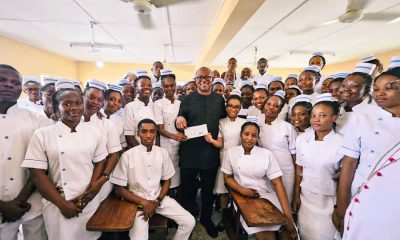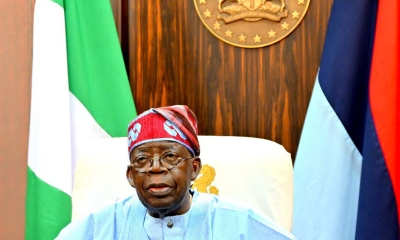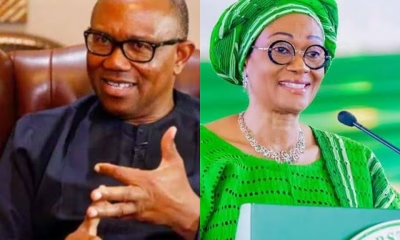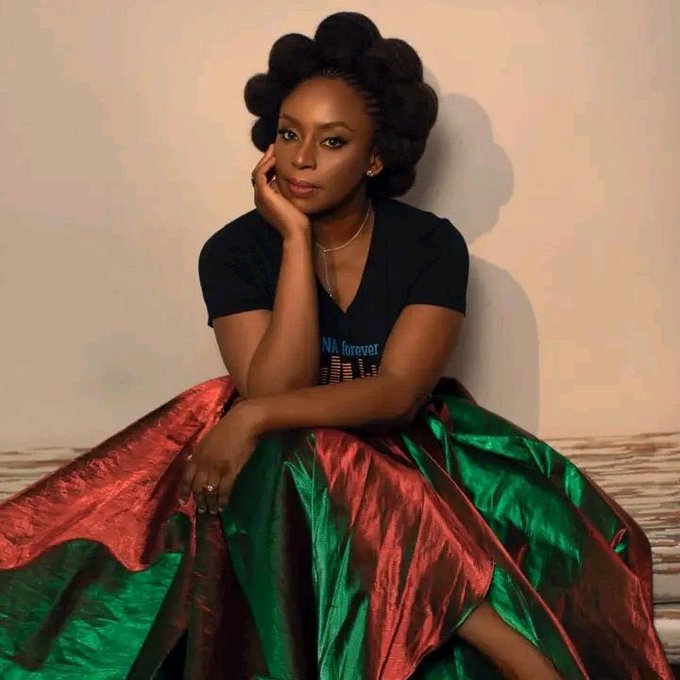

News
2023 Election: What Chimamanda Adichie Told US President about the outcome [Full Text]
Popular novelist, Chimamanda Adichie, has urged United States President, Joe Biden, not to recognise the outcome of the February 25th presidential election in Nigeria.
Adichie stated that the presidential election was imperiled not by technical shortcomings but by deliberate manipulation.
Read the full letter below:
Dear President Biden,
Something remarkable happened on the morning of February 25, the day of the Nigerian presidential election. Many Nigerians went out to vote holding in their hearts a new sense of trust. Cautious trust, but still trust. Since the end of military rule in 1999, Nigerians have had little confidence in elections. To vote in a presidential election was to brace yourself for the inevitable aftermath: fraud.
Elections would be rigged because elections were always rigged; the question was how badly. Sometimes voting felt like an inconsequential gesture as predetermined “winners” were announced.
A law passed last year, the 2022 Electoral Act, changed everything. It gave legal backing to the electronic accreditation of voters and the electronic transmission of results, in a process determined by the Independent National Electoral Commission (INEC). The chair of the commission, Professor Mahmood Yakubu, assured Nigerians that votes would be counted in the presence of voters and recorded in a result sheet, and that a photo of the signed sheet would immediately be uploaded to a secure server. When rumors circulated about the commission not keeping its word, Yakubu firmly rebutted them.
In a speech at Chatham House in London (a favorite influence-burnishing haunt of Nigerian politicians), he reiterated that the public would be able to view “polling-unit results as soon as they are finalized on election day.”
Nigerians applauded him. If results were uploaded right after voting was concluded, then the ruling party, the All Progressives Congress (APC), which has been in power since 2015, would have no opportunity for manipulation. Technology would redeem Nigerian democracy. Results would no longer feature more votes than voters. Nigerians would no longer have their leaders chosen for them. Elections would, finally, capture the true voice of the people. And so trust and hope were born.
By the evening of February 25, 2023, that trust had dissipated. Election workers had arrived hours late, or without basic election materials. There were reports of violence, of a shooting at a polling unit, and of political operatives stealing or destroying ballot boxes. Some law-enforcement officers seemed to have colluded in voter intimidation; in Lagos, a policeman stood idly by as an APC spokesperson threatened members of a particular ethnic group who he believed would vote for the opposition.
Most egregious of all, the electoral commission reneged on its assurance to Nigerians. The presidential results were not uploaded in real time. Voters, understandably suspicious, reacted; videos from polling stations show voters shouting that results be uploaded right away. Many took cellphone photos of the result sheets. Curiously, many polling units were able to upload the results of the House and Senate elections, but not the presidential election. A relative who voted in Lagos told me, “We refused to leave the polling unit until the INEC staff uploaded the presidential result.
The poor guy kept trying and kept getting an ‘error’ message. There was no network problem. I had internet on my phone. My bank app was working. The Senate and House results were easily uploaded. So why couldn’t the presidential results be uploaded on the same system?” Some electoral workers in polling units claimed that they could not upload results because they didn’t have a password, an excuse that voters understood to be subterfuge. By the end of the day, it had become obvious that something was terribly amiss.
No one was surprised when, by the morning of the 26th, social media became flooded with evidence of irregularities. Result sheets were now slowly being uploaded on the INEC portal, and could be viewed by the public. Voters compared their cellphone photos with the uploaded photos and saw alterations: numbers crossed out and rewritten; some originally written in black ink had been rewritten in blue, some blunderingly whited-out with Tipp-Ex. The election had been not only rigged, but done in such a shoddy, shabby manner that it insulted the intelligence of Nigerians.
Nigerian democracy had long been a two-party structure—power alternating between the APC and the Peoples Democratic Party—until this year, when the Labour Party, led by Peter Obi, became a third force. Obi was different; he seemed honest and accessible, and his vision of anti-corruption and self-sufficiency gave rise to a movement of supporters who called themselves “Obi-dients.”
Unusually large, enthusiastic crowds turned up for his rallies. The APC considered him an upstart who could not win, because his small party lacked traditional structures. It is ironic that many images of altered result sheets showed votes overwhelmingly being transferred from the Labour Party to the APC.
As vote counting began at INEC, representatives of different political parties—except for the APC—protested. The results being counted, they said, did not reflect what they had documented at the polling units. There were too many discrepancies.
“There is no point progressing in error, Mr. Chairman. We are racing to nowhere,” one party spokesperson said to Yakubu. “Let us get it right before we proceed with the collation.” But the INEC chair, opaque-faced and lordly, refused. The counting continued swiftly until, at 4:10 a.m. on March 1, the ruling party’s candidate, Bola Tinubu, was announced as president-elect.
A subterranean silence reigned across the country. Few people celebrated. Many Nigerians were in shock. “Why,” my young cousin asked me, “did INEC not do what it said it would do?”
It seemed truly perplexing that, in the context of a closely contested election in a low-trust society, the electoral commission would ignore so many glaring red flags in its rush to announce a winner. (It had the power to pause vote counting, to investigate irregularities—as it would do in the governorship elections two weeks later.)
Rage is brewing, especially among young people. The discontent, the despair, the tension in the air have not been this palpable in years.
How surprising then to see the U.S. State Department congratulate Tinubu on March 1. “We understand that many Nigerians and some of the parties have expressed frustration about the manner in which the process was conducted and the shortcomings of technical elements that were used for the first time in a presidential election cycle,” the spokesperson said. And yet the process was described as a “competitive election” that “represents a new period for Nigerian politics and democracy.”
American intelligence surely cannot be so inept. A little homework and they would know what is manifestly obvious to me and so many others: The process was imperiled not by technical shortcomings but by deliberate manipulation.
An editorial in The Washington Post echoed the State Department in intent if not in affect. In an oddly infantilizing tone, as though intended to mollify the simpleminded, we are told that “officials have asserted that technical glitches, not sabotage, were the issue,” that “much good” came from the Nigerian elections, which are worth celebrating because, among other things, “no one has blocked highways, as happened in Brazil after Jair Bolsonaro lost his reelection bid.” We are also told that “it is encouraging, first, that the losing candidates are pursuing their claims through the courts,” though any casual observer of Nigerian politics would know that courts are the usual recourse after any election.
The editorial has the imaginative poverty so characteristic of international coverage of African issues—no reading of the country’s mood, no nuance or texture. But its intellectual laziness, unusual in such a rigorous newspaper, is astonishing. Since when does a respected paper unequivocally ascribe to benign malfunction something that may very well be malignant—just because government officials say so? There is a kind of cordial condescension in both the State Department’s and The Washington Post’s responses to the election. That the bar for what is acceptable has been so lowered can only be read as contempt.
I hope, President Biden, that you do not personally share this cordial condescension. You have spoken of the importance of a “global community for democracy,” and the need to stand up for “justice and the rule of law.” A global community for democracy cannot thrive in the face of apathy from its most powerful member. Why would the United States, which prioritizes the rule of law, endorse a president-elect who has emerged from an unlawful process?
Compromised is a ubiquitous word in Nigeria’s political landscape—it is used to mean “bribed” but also “corrupted,” more generally. “They have been compromised,” Nigerians will say, to explain so much that is wrong, from infrastructure failures to unpaid pensions. Many believe that the INEC chair has been “compromised,” but there is no evidence of the astronomical U.S.-dollar amounts he is rumored to have received from the president-elect. The extremely wealthy Tinubu is himself known to be an enthusiastic participant in the art of “compromising”; some Nigerians call him a “drug baron” because, in 1993, he forfeited to the United States government $460,000 of his income that a Chicago court determined to be proceeds from heroin trafficking. Tinubu has strongly denied all charges of corruption.
I hope it will not surprise you, President Biden, if I argue that the American response to the Nigerian election also bears the faint taint of that word, compromised, because it is so removed from the actual situation in Nigeria as to be disingenuous. Has the United States once again decided that what matters in Africa is not democracy but stability? (Perhaps you could tell British Prime Minister Rishi Sunak, who quickly congratulated Tinubu, that an illegitimate government in a country full of frustrated young people does not portend stability.) Or is it about that ever-effulgent nemesis China, as so much of U.S. foreign policy now invariably seems to be? The battle for influence in Africa will not be won by supporting the same undemocratic processes for which China is criticized.
This Nigerian election was supposed to be different, and the U.S. response cannot—must not—be business as usual. The Nigerian youth, long politically quiescent, have awoken. About 70 percent of Nigerians are under 30 and many voted for the first time in this election. Nigerian politicians exhibit a stupefying ability to tell barefaced lies, so to participate in political life has long required a suspension of conscience. But young people have had enough. They want transparency and truth; they want basic necessities, minimal corruption, competent political leaders, and an environment that can foster their generation’s potential.
This election is also about the continent. Nigeria is a symbolic crucible of Africa’s future, and a transparent election will rouse millions of other young Africans who are watching, and who long, too, for the substance and not the hollow form of democracy. If people have confidence in the democratic process, it engenders hope, and nothing is more essential to the human spirit than hope.
Today, election results are still being uploaded on the INEC server. Bizarrely, many contradict the results announced by INEC. The opposition parties are challenging the election in court. But there is reason to worry about whether they will get a fair ruling. INEC has not fully complied with court orders to release election materials. The credibility of the Nigerian Supreme Court has been strained by its recent judgments in political cases, or so-called judicial coronations, such as one in which the court declared the winner of the election for governor of Imo State a candidate who had come in fourth place.
Lawlessness has consequences. Every day Nigerians are coming out into the streets to protest the election. APC, uneasy about its soiled “victory,” is sounding shrill and desperate, as though still in campaign mode. It has accused the opposition party of treason, an unintelligent smear easily disproved but disquieting nonetheless, because false accusations are often used to justify malicious state actions.
I supported Peter Obi, the Labour Party candidate, and hoped he would win, as polls predicted, but I was prepared to accept any result, because we had been assured that technology would guard the sanctity of votes. The smoldering disillusionment felt by many Nigerians is not so much because their candidate did not win as because the election they had dared to trust was, in the end, so unacceptably and unforgivably flawed.
Congratulating its outcome, President Biden, tarnishes America’s self-proclaimed commitment to democracy. Please do not give the sheen of legitimacy to an illegitimate process. The United States should be what it says it is.
Sincerely,
Chimamanda Adichie
News
BREAKING: Court Sentences Nnamdi Kanu to Life Imprisonment
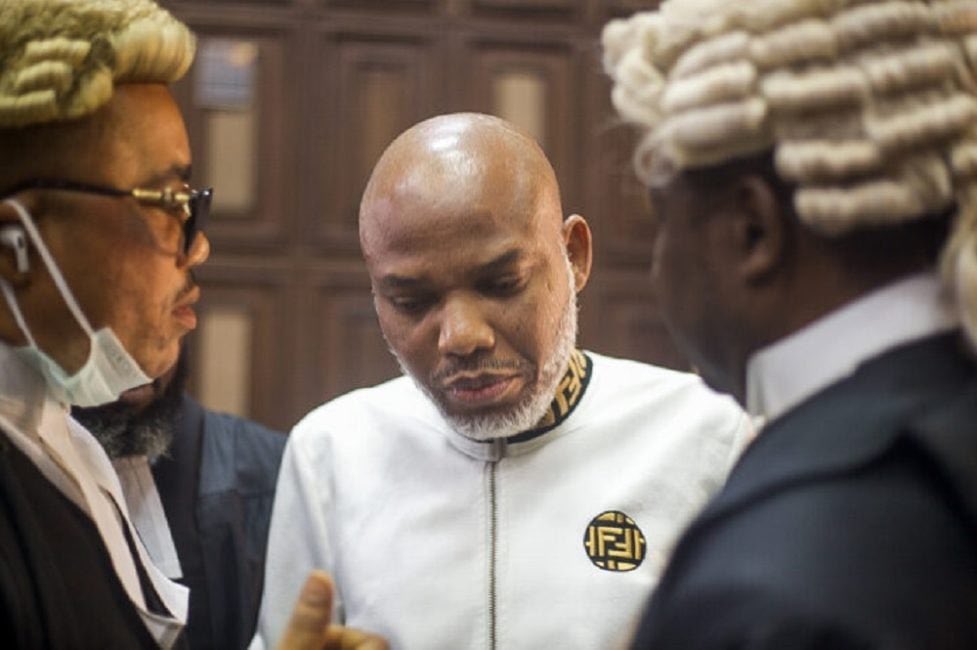
Justice James Omotosho of the Federal High Court in Abuja has sentenced Nnamdi Kanu, leader of the proscribed Indigenous People of Biafra (IPOB), to life imprisonment, marking a major climax to a decade-long trial.
The judgment, delivered on Thursday, comes four years after Kanu was arrested in Kenya under controversial circumstances and returned to Nigeria to face terrorism charges.
Kanu was convicted on all seven counts bordering on terrorism, despite pleading not guilty throughout the trial.
The judgment was delivered in his absence after he insisted that the court would not deliver judgment in the case. His refusal to participate prompted Justice Omotosho to order security operatives to remove him from the courtroom over what the judge described as “unruly behaviour.”
In his ruling, Justice Omotosho held that several of Kanu’s broadcasts on Radio Biafra amounted to acts of terrorism, noting that his rhetoric was intentionally violent and targeted at destabilizing the country.
He added that Kanu’s sit-at-home directives in the South-East constituted terrorism, describing the order as a violation of citizens’ constitutional right to freedom of movement.
The court further stated that evidence before it showed Kanu had carried out “preparatory acts of terrorism” through broadcasts in which he allegedly ordered attacks on police and military personnel.
Justice Omotosho concluded that Kanu committed acts of terrorism against the Federal Republic of Nigeria, warranting the sentence imposed.
News
FG Seeks Death Penalty for Nnamdi Kanu After Terrorism Conviction
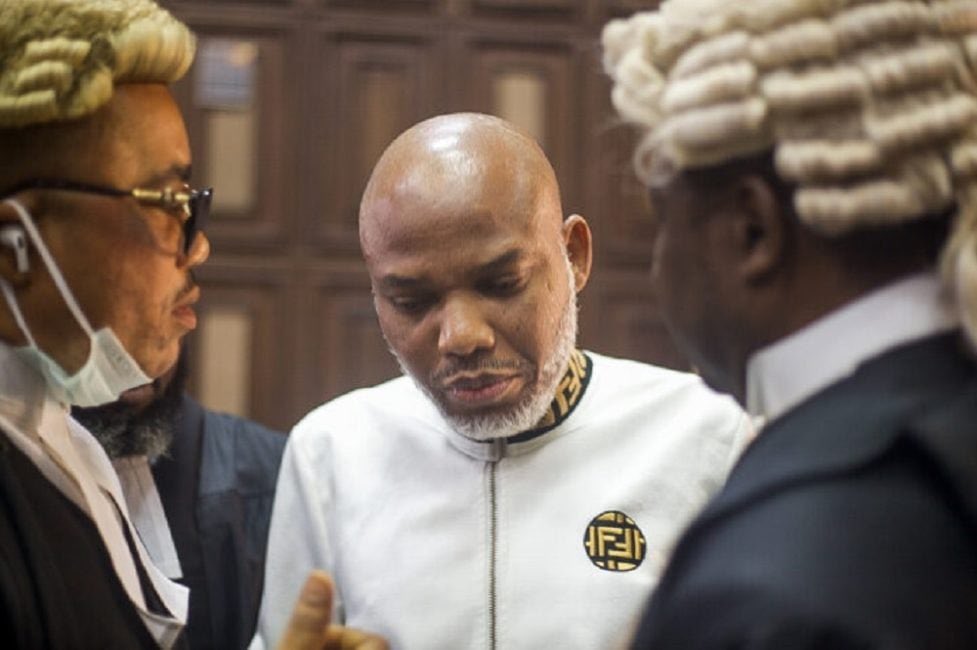
The Federal Government has urged the Federal High Court in Abuja to impose the death penalty on Nnamdi Kanu, leader of the proscribed Indigenous People of Biafra (IPOB), following his conviction on seven counts of terrorism on Thursday.
Justice James Omotosho delivered the judgment after ruling that the prosecution had proved its case beyond reasonable doubt, finding Kanu guilty on all seven charges.
Moments after the conviction, the Federal Government’s lead counsel, Adegboyega Awomolo, SAN, asked the court to apply the maximum punishment prescribed under the Terrorism Prevention (Amendment) Act, 2013.
Awomolo told the court that several of the offences for which Kanu was found guilty carry a mandatory death sentence.
“My Lord, consequent upon the conviction, nothing further remains but the lawful imposition of sentence. The punishment prescribed for the offences in Counts One, Two, Four, Five and Six, pursuant to Section 12H of the Terrorism Prevention Amendment Act 2013, is death,” Awomolo said.
“With all sense of humility, I say as a prosecutor that this court has no discretion in that regard. The only sentence Your Lordship can impose for Counts One, Two, Four, Five and Six is death, because the law empowers you to do so, and we expect that you will.”
Sentencing is expected to follow after the court considers all submissions from both sides.
WATCH THE PROSECUTOR SPEAK
Biafra
BREAKING: Nnamdi Kanu Convicted on Terrorism Charges by Federal High Court
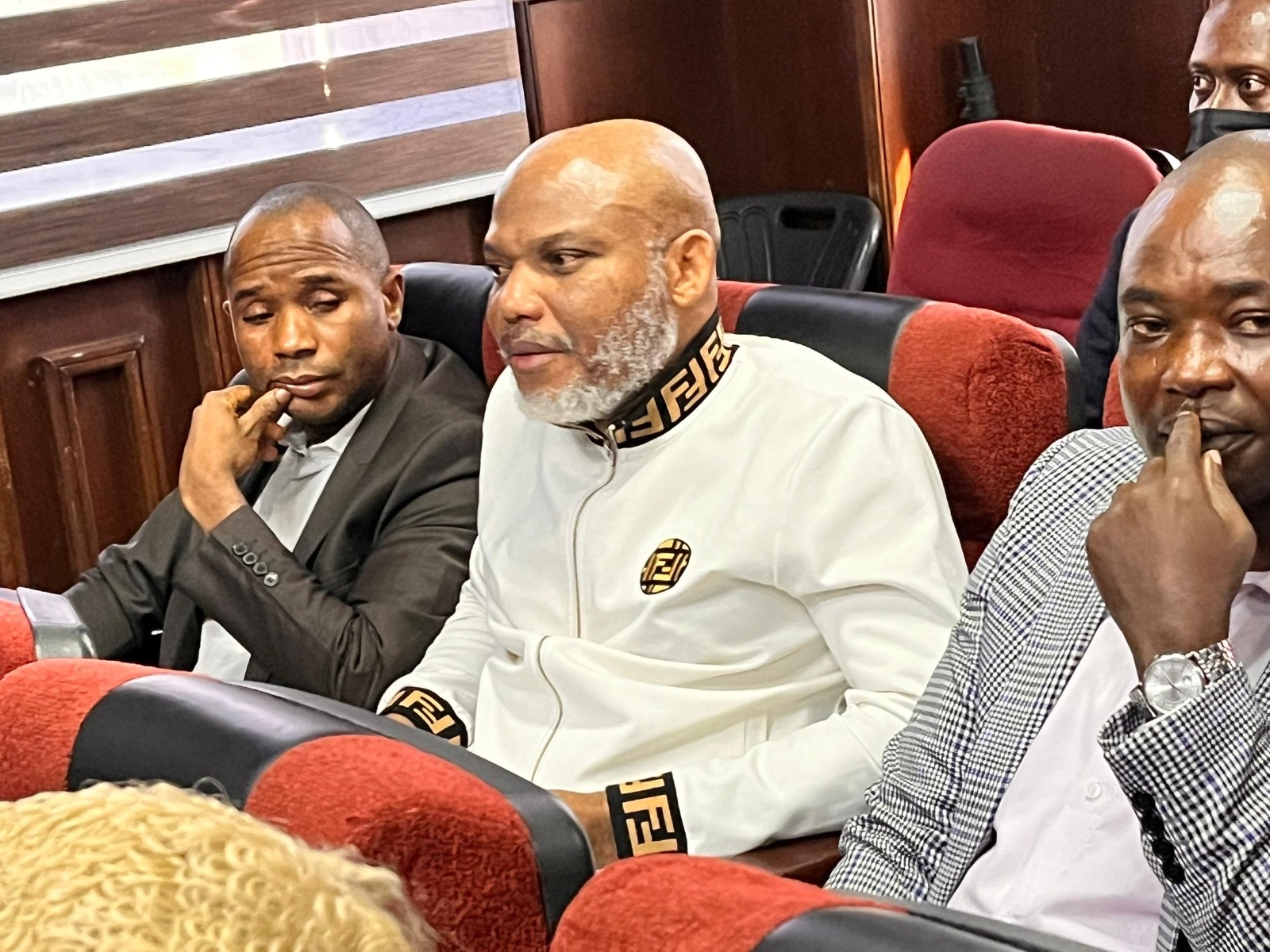
Mazi Nnamdi Kanu, leader of the Indigenous People of Biafra (IPOB), has been convicted on terrorism charges filed against him by the Nigerian government. The verdict was delivered on Tuesday by a Federal High Court in Abuja, presided over by Justice James Omotosho.
Kanu, who had previously resisted the court proceedings and refused to participate in his defence, was found guilty on all counts. According to Justice Omotosho, the court had no choice but to rely on the evidence presented by the prosecution after Kanu declined to engage in his defence.
“As an Apostle of Jesus Christ, I begged Kanu passionately to enter his defence, but he obstinately refused,” Justice Omotosho said.
Key Convictions
- Terrorism through broadcasts: Kanu was found guilty of inciting violence through broadcasts linked to IPOB activities.
- International terrorism: The court ruled that Kanu qualifies as an international terrorist.
- Sit-at-home orders in South-East Nigeria: He was convicted for enforcing sit-at-home directives that disrupted businesses and daily life across the South-East states.
- Murder of Ahmed Gulak: The court linked Kanu and members of the Eastern Security Network (ESN) to the murder of the former politician in Imo State.
- Leadership of a proscribed organisation: Kanu was also convicted for leading IPOB, which is officially listed as a terrorist organisation in Nigeria.
Justice Omotosho emphasized that Kanu’s refusal to enter a defence left the court with no alternative but to act on the incontrovertible evidence presented by the prosecution.
The court’s ruling marks a major development in Nigeria’s ongoing fight against terrorism and separatist agitation in the South-East.
More updates to follow…
News
Alleged Genocide: ‘Trump Is Serious, Not Making Empty Threats’ – Riley Moore Warns Nigerian Delegation
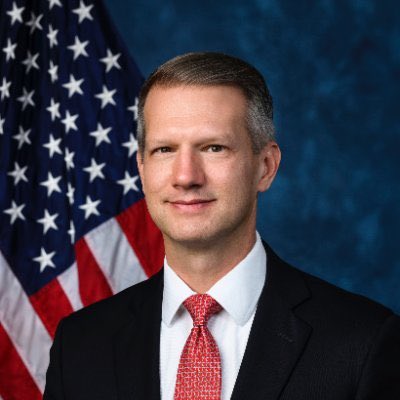
A high-powered Nigerian government delegation led by National Security Adviser Nuhu Ribadu met with U.S. lawmakers on Wednesday amid escalating allegations of Christian persecution and genocide in Nigeria.
The visit comes after former U.S. President Donald Trump redesignated Nigeria as a Country of Particular Concern and ordered an investigation into claims that Christians are being targeted. The move followed comments by Nigeria’s Vice-President, Kashim Shettima, who recently backed a two-state solution to the Israel–Gaza conflict, triggering intensified scrutiny from U.S. political and religious groups.
Trump tasked several lawmakers, including Congressman Riley Moore, to lead the inquiry. Despite repeated attempts by the Nigerian government to counter what it describes as a false narrative, U.S. officials have continued to act on growing claims that Christian communities face systemic persecution.
Tensions escalated further on Tuesday when American rapper Nicki Minaj was invited to the United Nations to testify against Nigeria in a session organised with the backing of the U.S. Mission to the UN. Nigerian officials were barred from attending the hearing, prompting a strong protest.
Nigeria’s Chargé d’Affaires to the UN, Syndoph Endoni, condemned the move, likening it to “shaving our head in our absence.”
Ribadu Meets U.S. Congressmen
On Wednesday, Ribadu and senior government officials met Congressman Moore in Washington, D.C., to present Nigeria’s position and address concerns surrounding insecurity and religious violence.
The delegation included Minister of State for Foreign Affairs Bianca Ojukwu, Inspector General of Police Kayode Egbetokun, Attorney-General Lateef Fagbemi, Chief of Defence Staff Gen. Olufemi Oluyede, Chief of Defence Intelligence Lt. Gen. E.A.P. Undiendeye, among other top security officials.
Moore confirmed the meeting on social media, describing the engagement as “open and constructive.” He said discussions focused on terrorism, security cooperation, and the protection of vulnerable communities across Nigeria.
“Today, I had a frank, honest, and productive discussion with senior members of the Nigerian government regarding the horrific violence and persecution Christians face and the ongoing threat terrorism poses across Nigeria,” Moore said.
He added that he had insisted the U.S. expects “tangible steps to ensure that Christians are not subject to violence, persecution, displacement, and death simply for believing in our Lord and Savior Jesus Christ.”
Moore said the United States is willing to deepen collaboration with Nigeria to combat Boko Haram, ISWAP, and violent extremist groups, especially in the Northeast and Middle Belt.
He issued a strong warning, emphasising that both Congress and Trump are aligned on holding Nigeria accountable:
“President Trump and Congress are united and serious in our resolve to end the violence against Christians and disrupt and destroy terrorist groups within Nigeria.”
As of Wednesday night, the Nigerian delegation had not released any public statement regarding the engagement.
Follow BONA NAIJA for more
Biafra
Judge Orders Nnamdi Kanu Out of Courtroom as Judgment Begins

Justice James Omotosho of the Federal High Court in Abuja on Thursday ordered security operatives to forcibly remove detained IPOB leader, Nnamdi Kanu, from the courtroom after the proceedings were repeatedly disrupted.
The dramatic scene unfolded moments after Kanu insisted that the court could not proceed with delivering judgment in the terrorism charges filed against him by the Federal Government.
Kanu, who raised his voice several times, demanded that the judge show him the section of the law that barred him from submitting a final written address. His outbursts halted the proceedings, prompting Justice Omotosho to stand down the matter while security agents escorted him out.
Before the disruption, Justice Omotosho had dismissed fresh applications filed by Kanu despite the case already being scheduled for judgment. According to the judge, the motions merely rehashed arguments previously raised and resolved in earlier rulings.
The court also rejected Kanu’s request to refer the matter to the Court of Appeal, citing Section 306 of the Administration of Criminal Justice Act (ACJA) 2015, which prohibits the stay of proceedings in criminal trials.
Additionally, Kanu’s bid for bail was turned down. Justice Omotosho, however, noted that some of the issues raised by the IPOB leader would be addressed during the final judgment.
The court has now commenced reading the judgment in the high-profile case.
-
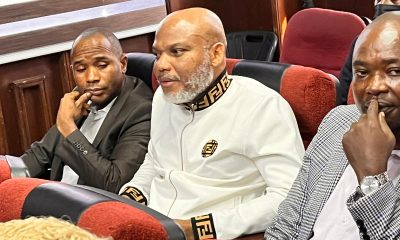
 Abuja3 weeks ago
Abuja3 weeks agoIPOB Leader Nnamdi Kanu Declines to Enter Defence, Insists “No Case” Against Him
-

 World News2 weeks ago
World News2 weeks agoUS Military Submits Contingency Plan for Action in Nigeria
-
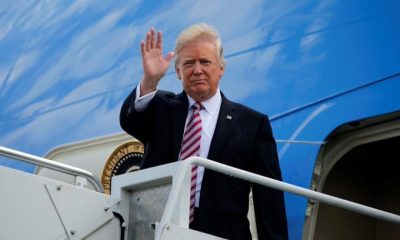
 World News3 weeks ago
World News3 weeks agoTrump asks Pentagon to immediately start testing U.S. nuclear weapons
-
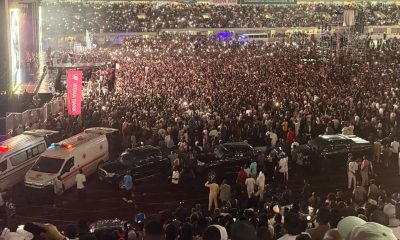
 Entertainment3 weeks ago
Entertainment3 weeks agoDavido Kicks Off ‘5ive Alive’ Tour with Sold-Out Uyo Stadium Show
-

 Music3 weeks ago
Music3 weeks agoMusic: Badshah and Davido Launch Cross-Cultural Hit “Wallah Wallah”
-

 Entertainment3 weeks ago
Entertainment3 weeks agoBurna Boy Makes Twitch Debut with PlaqueBoyMax in Freestyle Session
-

 Music News2 weeks ago
Music News2 weeks agoBurna Boy, Davido, Ayra Starr, Wizkid Lead Nigeria’s Charge in 2026 Grammy Nominations
-

 News2 weeks ago
News2 weeks agoGround Operation, Air Strikes Could Be Part of US Attack in Nigeria – Trump
-
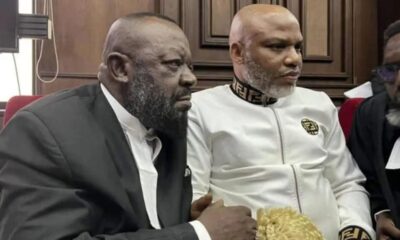
 Biafra4 weeks ago
Biafra4 weeks agoAnxiety as Nnamdi Kanu’s Lawyer, Aloy Ejimakor, Collapses in Kuje Prison
-
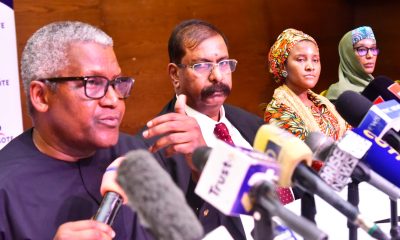
 Business3 weeks ago
Business3 weeks agoAliko Dangote Urges Nigerians to Sell Dollars as Naira Strengthens on Refinery Boost



